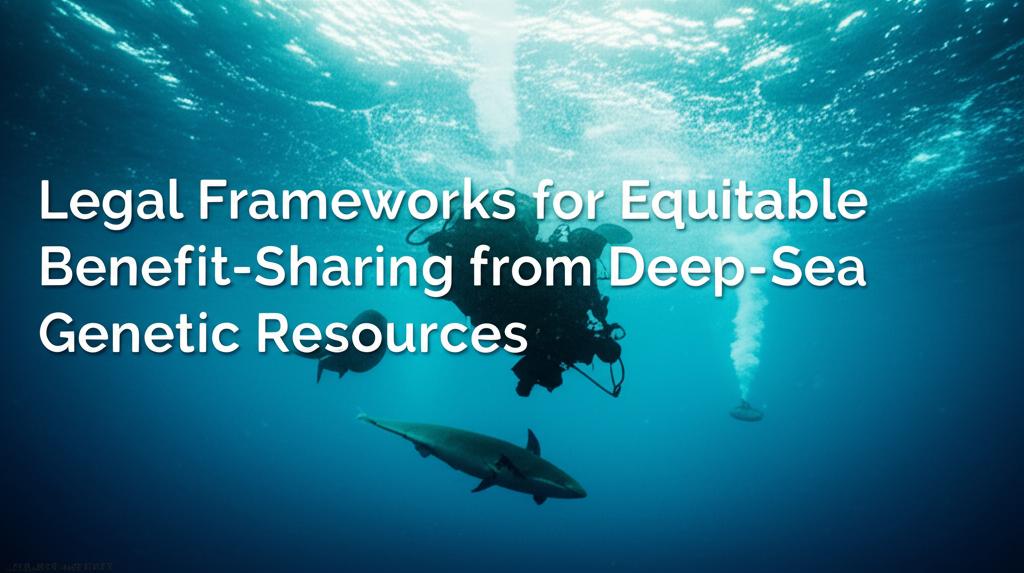The utilization of genetic resources from the deep sea, areas beyond national jurisdiction (ABNJ), has spurred the development of international legal frameworks aimed at ensuring that the benefits derived from these resources are shared equitably. A landmark development in this area is the adoption of the Agreement under the United Nations Convention on the Law of the Sea (UNCLOS) on the conservation and sustainable use of marine biodiversity of areas beyond national jurisdiction (BBNJ Agreement), also known as the High Seas Treaty, in June 2023. This agreement is pivotal as it establishes, for the first time, a dedicated mechanism for access and benefit-sharing (ABS) for marine genetic resources (MGRs) and associated digital sequence information (DSI) from these remote ocean areas.
Key Aspects of the Legal Framework under the BBNJ Agreement:- Balancing Research and Equity: Part II of the BBNJ Agreement seeks to strike a balance between fostering marine scientific research and ensuring the fair and equitable sharing of benefits arising from MGRs and DSI.
- Monetary and Non-Monetary Benefits: The framework mandates the sharing of both monetary and non-monetary benefits.
Non-monetary benefits include the transfer of knowledge and technology, capacity building, infrastructure development, increased scientific publications (including co-publication), open access to research data and discoveries, and contributions to biodiversity conservation. A key component is the establishment of a Clearing-House Mechanism.
Monetary benefits, initially, will involve developed State Parties making payments into a "Special Fund." These payments are initially decoupled from the commercial value of MGRs and are based on assessed contributions to the core budget. The Conference of the Parties (CoP) will periodically review these modalities, potentially including milestone payments, revenue percentages, or tiered fees in the future. This fund is designed to support capacity building and implementation assistance, particularly for developing states.
- Scope of Application: The BBNJ Agreement covers MGRs, defined broadly as any material of marine plant, animal, microbial, or other origin containing functional units of heredity with actual or potential value. It also applies to DSI derived from these MGRs, although "DSI" itself is not explicitly defined in the agreement.
- Notification and Traceability: To ensure transparency and traceability, the BBNJ Agreement requires pre-cruise, post-cruise, and utilization notifications to be submitted to the Clearing-House Mechanism. This system will generate a BBNJ batch identifier to accompany MGRs and DSI throughout their chain of custody.
- Institutional Framework: A dedicated Access and Benefit Sharing Committee will be established to oversee the implementation of these provisions, monitor compliance, and develop guidelines.
- Relationship with Existing Frameworks: The BBNJ Agreement complements existing instruments like the Convention on Biological Diversity (CBD) and its Nagoya Protocol, which primarily address genetic resources within national jurisdictions. The BBNJ extends ABS obligations to areas beyond national sovereignty. Discussions are ongoing regarding the alignment of DSI monetary benefit-sharing under the BBNJ Treaty with mechanisms being developed under the CBD, such as the Cali Fund.
- Retroactive Application: Uniquely, the benefit-sharing mechanism of the BBNJ Treaty may apply to the utilization of MGRs and DSI collected or generated before the treaty's entry into force, unless a State Party explicitly opts out in writing upon signing. The exact scope of this retroactive effect is still being clarified.
- Addressing Traditional Knowledge: The framework also acknowledges the relevance of traditional knowledge associated with MGRs of ABNJ and includes considerations for honoring the rights of Indigenous Peoples and local communities.
- Defining MGRs and DSI: While the BBNJ Agreement provides a definition for MGRs, the scope and practical application, particularly concerning DSI, will require ongoing clarification and development by the Conference of the Parties.
- Capacity Asymmetries: A significant challenge is the disparity in financial resources and technological capabilities between developed and developing nations to explore and utilize deep-sea genetic resources. The benefit-sharing mechanism aims to address this by enhancing the capacity of developing states.
- Financial Sustainability: Ensuring the financial sustainability of both monetary and non-monetary benefit-sharing is crucial. The costs associated with distributing non-monetary benefits (e.g., data infrastructure, training) and the uncertainties in generating monetary benefits from commercialization necessitate robust financial planning.
- Intellectual Property Rights: The regulation must address how intellectual property rights interact with the principle of benefit-sharing, ensuring that the appropriation of resources found in ABNJ through such rights is appropriately managed.
- Implementation and Monitoring: Effective implementation will depend on robust monitoring frameworks and the active participation of all State Parties.
The BBNJ Agreement opened for signature on September 20, 2023, and will remain open for two years. It will enter into force 120 days after 60 states have ratified it. Until then, signatories are obligated to act in a manner consistent with the treaty's objectives. The successful implementation of its provisions on equitable benefit-sharing will be crucial for fostering sustainable use of deep-sea genetic resources, promoting scientific advancement globally, and ensuring that the benefits derived from these common heritage resources contribute to the well-being of all nations and the conservation of marine biodiversity.

